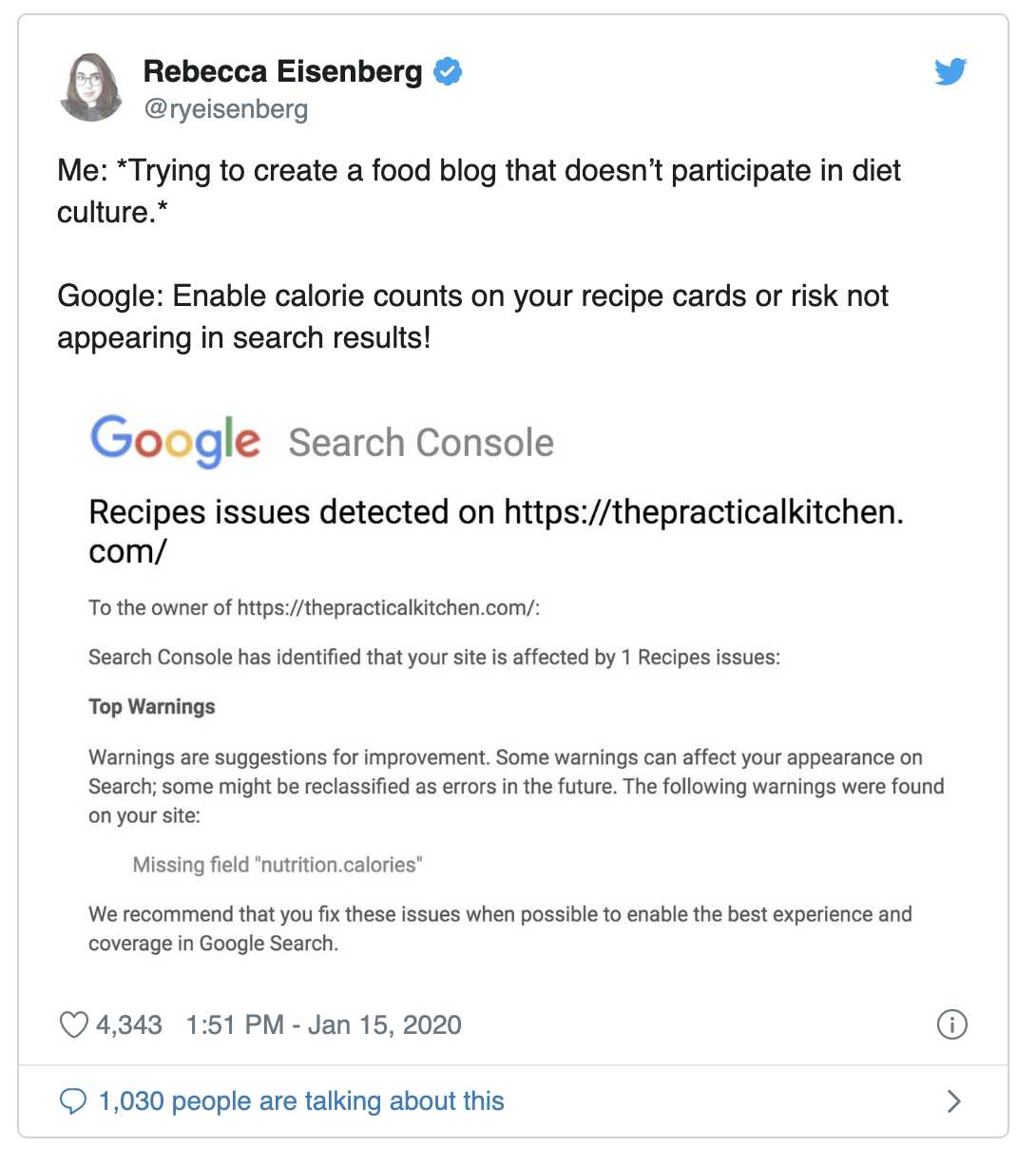Subscribe now and get the latest podcast releases delivered straight to your inbox.
Google doesn't require structured data — but does recommend it

Jan 22, 2020

The SEO community was abuzz the past few days about the role of Google's structured data in both Google search results and Google search rankings.
According to this Search Engine Journal article, food blogger Rebecca Eisenberg published a tweet with a screenshot of a Google message seemingly warning her to include structured data in her post.

Danny Sullivan, Google's search liaison, then clarified that it wasn't a warning to include structured data; it was a recommendation.
Not including the data, Sullivan expanded, wouldn't impact search rankings. Google's position has been that structured data only affects the searcher's visual experience of the search results.
What is structured data?
Structured data is information that fits within standardized formatting norms so Google can easily understand and classify pages.
With an understanding of structured data, content creators can designate information as a certain type: a customer service contact, a date, and more.
In Eisenberg's case, the data at hand was the calorie count. Google has a structured data field for calories in the nutrition section ("nutrition.calories") for pages that appear to be posted recipes. Structured data like this is just one of the Google SERP features that SEOs should focus on in 2020.
Search engines, including Google, Yahoo, Bing, and Yandex, collaborated to create Schema.org in 2011. This project created a standard lexicon of identifiable microdata elements that create rich snippets.
Incorporating structured data helps businesses create immediately useful and visually striking results for search queries, especially as Google continues to differentiate results by the type of query or post.
A recipe search, for example, populates the search results with recipes; this has been the case for years. Now, the results can show images, star ratings, the calorie count, and the time required to make the recipe.
Publishers don't have to include the information in order to rank highly. But including it can give human readers the details they need, and it makes specific results more appealing.
There is a subtle mark of distinction that SEO experts are still debating. Structured data, companies like Google report, does not directly improve search rankings. A web page with more microdata does not automatically rank above a web page with fewer or no rich snippets in the search result fragment.
However, the inclusion does tend to result in a higher click-through rate because it's more appealing to most search engine users.
This, in turn, helps pages climb through the rankings due to more engagement, and the momentum can bring other pages on the domain into higher prominence for an overall positive effect.
Through that lens, using structured data certainly seems to impact SERP performance — but only because of user engagement.
As far as rankings are concerned, Sullivan's answer seems to conclude that structured data is for human eyes, not for bots. It's helpful but not required.
Google's recent switch to BERT, a natural language learning algorithm that can better interpret search queries by relevance, further entrenches the idea that structured data isn't a requirement.
Because BERT can intuitively understand when users are searching for recipes and when pages answer that need well, structured data would play a smaller role, anyway.
What's the takeaway about structured data?
There are no new changes to structured data or its role in content creation and searches. But the social media explosion surrounding the tweet is still significant.
It showcases how miscommunication can spread due to snapshots and momentary frustrations. It also highlights a growing communication gap between how Google's systems work and how they appear to work.
For now, SEO professionals should carefully read issues detection messages to distinguish warnings from recommendations.
How to use structured data
Whether search engines prioritize pages with structured data or not, it creates a positive SEO effect. Almost any website that relies on traffic from search engines rather than purely organic traffic benefits from adding tags, or microdata, to key terms and pieces of information.
But getting started can be difficult. That's why Google created its Structured Data Markup Helper and Structured Data Testing Tool to let SEOs examine pages for areas for improvement and to input microdata in the first.
Focusing on microdata that will show up in search engine results is a good step for making immediate improvements to how searchers interact with a site and how they evaluate competitive search results.
A small change in SERP engagement can lead to a gradual increase in rankings and popularity, even if the site doesn't experience an automatic algorithmic boost.
Free: Assessment